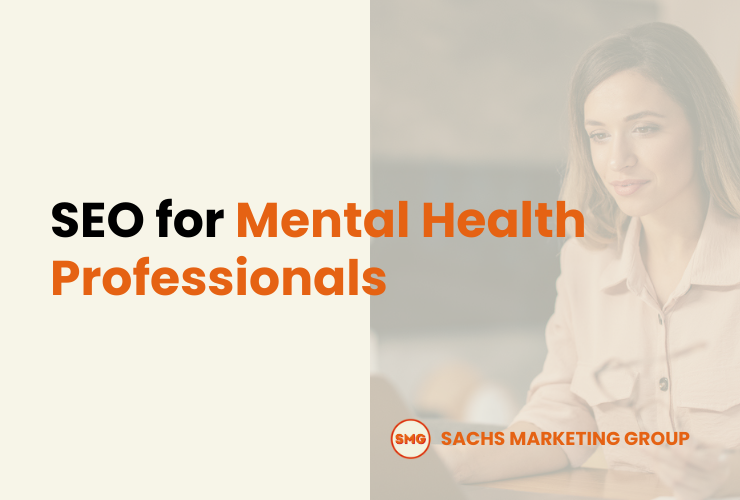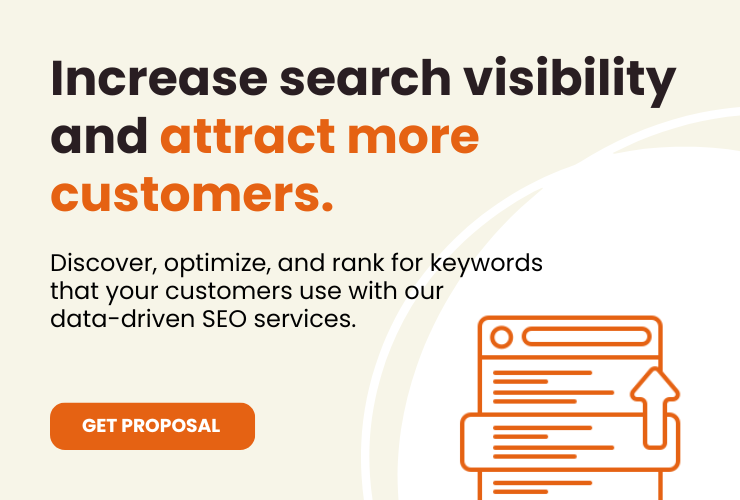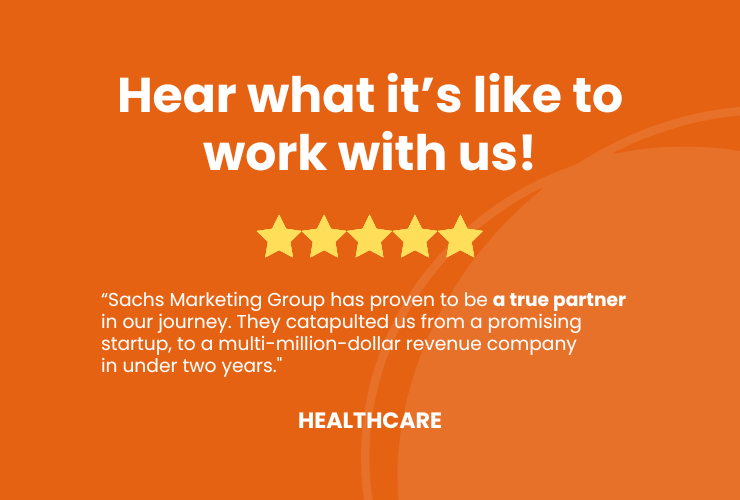SEO for therapists and mental health professionals can be a game-changer. By optimizing your online presence, you elevate your visibility on search engines like Google. This, in turn, can drive more organic traffic to your website or practice, potentially leading to increased appointments and better engagement with your target audience.

Search Engine Optimization (SEO) is no longer a luxury – it's a necessity, especially for a specialized field like mental health.
With the surge in people seeking online resources for mental health issues, being visible on search engines is critical. SEO for therapists and mental health professionals ensures that when someone searches for a therapist or mental health resource, your practice appears prominently.
Being highly visible on search engines not only improves your accessibility but also adds a layer of credibility to your practice.
In this article, you will discover the importance of search engine visibility and the benefits of SEO for therapists and mental health professionals.
Overview
SEO for Therapists and Mental Health Professionals
It’s crucial to understand that SEO is not a one-time task but an ongoing process. Like any form of marketing, it requires a strategic approach and constant monitoring.
What worked a year ago may not be as effective now due to algorithm changes and competitive landscapes. It’s all about staying ahead in the digital space, and SEO provides that edge.
Here’s an overview of the most essential aspects of performing SEO for therapists and mental health professionals.
1. Conduct Keyword Research
Keyword research is the cornerstone of any effective SEO strategy, and it holds significant value when optimizing SEO for therapists and mental health professionals. It's essential to understand what terms potential clients are using in their searches to find services similar to yours. By identifying relevant SEO keywords for therapists or other mental health professionals, you can tailor your website's content, meta tags, and even images to align with these search queries, thereby increasing the chances of your website appearing in the search results.
For example, if you are a mental health professional specializing in cognitive behavioral therapy in New York City, you might target long-tail keywords like "best cognitive behavioral therapist in NYC" or "New York City CBT services." These SEO keywords for therapists and mental health professionals can be more effective at capturing qualified leads than more general keywords like "therapist" or "mental health services."
Keyword research isn't a one-off task but requires regular updates to keep pace with changes in search patterns and industry trends. Tools like Google's Keyword Planner can provide updated data on keyword search volumes and competitiveness, helping you refine your strategy over time.
2. Optimize Meta Tags
Meta tags, particularly the meta title and description, are an often overlooked aspect of SEO for therapists and mental health professionals. These snippets of text appear in search engine results and give potential visitors a quick overview of what to expect from your website.
A well-crafted meta tag should be compelling and include one or more of your target keywords to indicate the relevance of the page to the search engines.
For example, a webpage offering cognitive behavioral therapy might feature a meta title like "Cognitive Behavioral Therapy in [Your Location] | [Your Practice’s Name]." The meta description could further elaborate with, "Looking for results-driven cognitive behavioral therapy in [Your Location]? Discover how [Your Practice's Name] can help restore harmony in your life."
Remember, meta tags are not just for search engines; they also play a crucial role in user experience. Writing them thoughtfully can significantly improve the click-through rates to your site, thereby potentially improving your ranking in search results.
3. Create High-Quality Content
Creating high-quality content is crucial for SEO for therapists and mental health professionals. Not only does quality content establish you as an authority in your field, but it also increases the likelihood of other reputable sites linking back to yours—a significant SEO ranking factor. Content can come in various forms, from blog posts and articles to videos and infographics, and should aim to offer real value to your audience.
For example, you could write a detailed blog post on managing stress through mindfulness techniques. By providing actionable tips, citing credible sources, and offering expert insights, you increase the likelihood of your article being shared or linked to, which can significantly enhance your SEO.
While keyword optimization is important, it's crucial to maintain a natural flow and not to "stuff" your content with keywords in a way that hinders readability. After all, your primary audience is humans looking for mental health support, not just search engine bots. Quality content not only aids in SEO but also builds trust and encourages engagement, driving your overall marketing efforts.
4. Build Internal Links Strategically
Strategic internal linking is an invaluable element in SEO for mental health professionals, like therapists, psychologists, program directors, and doctors. Internal links are hyperlinks that point to other pages within your website. Not only do these links help in distributing page authority throughout your site, but they also improve the user experience by directing visitors to additional relevant information. This keeps visitors on your site longer, reducing your bounce rate, which is a positive signal to search engines.
For example, if you have a blog post on anxiety management techniques, you can link it to your service page about anxiety counseling. This not only keeps the user engaged but also subtly encourages them to explore your services.
Internal linking is not something to be done haphazardly. Each link should provide value and contribute to a better understanding of the subject matter discussed. When implemented carefully, internal linking can significantly improve your site's SEO performance while elevating the user experience.
5. Attract External Links from Other Websites
Attracting external links, commonly known as backlinks, is crucial for SEO for therapists and mental health professionals. Backlinks are a significant ranking factor for search engines, as they view them as endorsements from other reputable sources. The more quality backlinks you acquire, the more likely your site will rank higher in search engine results.
For example, you could collaborate with a health and wellness website to publish an article on the importance of mental health, which then links back to your site. Not only does this provide a backlink, but it also exposes your practice to a broader audience. For more powerful backlinks, a digital marketing agency can help develop links from highly-relevant websites that are considered authorities in health, including sites like WebMD, Vitals.com, and Psychology Today.
It's important to focus on the quality rather than the quantity of backlinks. Links from authoritative, well-respected websites in your field will carry more weight than links from less reputable sources. Additionally, the link's anchor text should be relevant to your services or area of expertise to maximize its impact.
6. Make Your Website Mobile-Friendly
In today's digital age, having a mobile-friendly website is non-negotiable, particularly in the realm of SEO for therapists. With the majority of searches now conducted on mobile devices, search engines like Google prioritize mobile-optimized sites in their rankings. Moreover, a mobile-friendly website enhances the user experience, increasing the likelihood that visitors will stay longer and interact more with your content.
For instance, if a potential client searches for mental health services on their smartphone and lands on your site, a mobile-optimized design ensures that the content displays correctly and navigation is smooth, thereby increasing the chance of converting this visitor into a client.
Ensuring mobile compatibility is not a one-time action but requires ongoing adjustments and tests, especially as search engines continually update their algorithms. You can use tools like Google's Mobile-Friendly Test to gauge how well your site performs on mobile devices and to identify areas for improvement.
7. Leverage Local SEO
Local SEO is particularly beneficial for practitioners looking to attract clients within a specific geographical area. Listings in local directories, consistent name, address, and phone number (NAP) information across the web, and online reviews are all critical aspects of local SEO for mental health clinicians. By focusing on local SEO, you can appear in local search results and Google's "Map Pack," which significantly increases visibility for users looking for local services.
For example, if your practice is in Chicago, optimizing your site and content with keywords like "mental health professional in Chicago" or "Chicago-based therapist" can help you appear in local search results. Moreover, encouraging satisfied clients to leave reviews on platforms like Google My Business can significantly bolster your local SEO efforts.
The ultimate goal of local SEO is to appear in the top three local listings when potential clients search for services you offer in your location. Achieving this can result in increased calls and consultation bookings, significantly impacting your practice's success.
8. Optimize Page Load Speed
Page load speed is an often-underestimated aspect of SEO for therapists. Slow loading times can severely impact user experience, leading to higher bounce rates and less time spent on your site, both of which negatively affect your search rankings. Google has also indicated that speed is a direct ranking factor, making it crucial to optimize for.
For example, you might use image compression tools to reduce the file sizes of images on your site, thus speeding up page load times. JavaScript and CSS files can also be minimized to improve speed.
Various tools are available to measure your website’s speed and provide actionable insights for improvement, such as Google’s PageSpeed Insights. Regular monitoring can help you maintain a speed-optimized site, thereby keeping both search engines and users satisfied.
9. Monitor and Analyze
One of the key aspects of successful SEO for therapists and mental health professionals is the ongoing monitoring and analysis of your efforts. Using tools like Google Analytics, you can track various metrics such as organic traffic, bounce rates, and conversion rates to gauge the effectiveness of your SEO strategies.
As an example, if you notice a sudden drop in traffic to your site, a quick analysis may reveal that a recent website update resulted in broken links, affecting your SEO negatively. This immediate insight enables you to rectify the issue promptly.
Regular monitoring allows you to make data-driven decisions and adapt your SEO strategies as needed. You'll understand what's working and what needs adjustment, enabling you to allocate resources more efficiently.
10. Hire a Professional SEO Company
Lastly, while many aspects of SEO can be managed in-house, there is undeniable value in hiring a professional SEO company specialized in serving mental health professionals. Companies like Sachs Marketing Group, which have been providing SEO services to mental health professionals since 2010, bring a wealth of expertise and tools that can significantly accelerate your SEO efforts.
For example, a professional SEO agency can conduct a thorough audit of your website, identify gaps and opportunities, and implement a robust SEO strategy tailored specifically for your practice. They can also manage the ongoing tasks of keyword research, backlink acquisition, and performance monitoring more efficiently than an in-house team with limited SEO experience.
Engaging the services of a professional SEO company frees you to focus on what you do best—providing quality mental health care. It's an investment that can yield significant returns, both in terms of visibility and client acquisition.
Need Help with Your SEO?
If you're a therapist or mental health professional struggling to achieve higher search rankings, you're not alone. Sachs Marketing Group is here to help!
Sachs Marketing Group is a digital marketing agency providing specialized SEO services to mental health professionals since 2010.
Imagine your practice showing up on the first page of Google. Imagine the trust and credibility that come with that. Now, stop imagining and make it a reality.
Contact us today and discover how we can help your practice grow!
Get a free, no obligation review of your digital marketing strategy!
"*" indicates required fields





